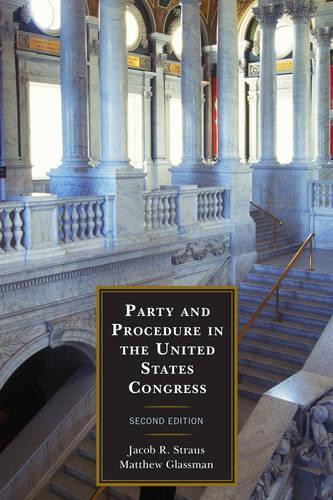
Party and Procedure in the United States Congress
(Hardback, Second Edition)
Available Formats
Hardback, Second Edition
Published: 20th July 2016
Paperback, Second Edition
Published: 15th July 2016
Publishing Details
Party and Procedure in the United States Congress
By (Author) Jacob R. Straus
Edited by Matthew E. Glassman
Bloomsbury Publishing PLC
Rowman & Littlefield Publishers
20th July 2016
Second Edition
United States
Classifications
Tertiary Education
Non Fiction
Political parties and party platforms
320.40973
Physical Properties
Hardback
360
Width 157mm, Height 237mm, Spine 19mm
553g
Description
Understanding how Congressional political parties utilize floor procedure to advance a legislative agenda is fundamental to understanding how Congress operates. This book offers students and researchers an in-depth understanding of the procedural tools available to congressional leaders and committee chairs and how those tools are implemented in the House of Representatives, the Senate, and during negotiations between the chambers. While other volumes provide the party or the procedural perspective, this book combines these two features to create a robust analysis of the role that party can play in making procedural decisions. Additionally, the contributors provide an opportunity to take a holistic look at Congress and understand the changing dynamics of congressional power and its implementation over time. The second edition of Party and Procedure in the United States Congress includes case studies and analyses of the changes and innovations that have occurred since 2012, including the nuclear option.
Reviews
First edition praise: For many scholars, trying to understand what Congress is doing and why it is doing it is a challenge. It is essential to understand the combined impact of political parties, organization, and the role and use of procedure. This volume provides an accessible and insightful set of essays that explain how political parties, institutional organization, and procedures such as roll call votes, the decline of deliberation in the Senate, the use of motions, and the filibuster in the Senate affect the functioning of Congress. The chapters are all clearly written and focus on important real-world examples. Highly recommended. * CHOICE *
First edition praise: Each work in this volume highlights the importance of procedural rules in a unique and intriguing manner. . . . The power of this book is the way examinations of both narrow and broad uses of procedural rules are seamlessly woven together. Individually, each book chapter can stand on its own, but together these works paint a fascinating picture of the strategic use of procedural rules in the modern Congress. * APSA Legislative Studies Section Newsletter, Book Notes *
To quote a line from The Wire, the game is out there, and its either play or get played. This excellent set of readings lucidly explains a rapidly changing legislative process, and lays out important details not available in most other books on Congress. With a nice balance of theoretical and practical perspectives, it provides a splendid overview of how party leaders, committee chairs, and backbench members play the game of legislative politics. -- John J. Pitney Jr., Roy P. Crocker Professor of American Politics, Claremont McKenna College
The breadth of topics that the volume covers is impressive yet specific enough to be both a stand alone text for classes and a supplement to more general books on the House, Senate, or American government more generally. -- Wendy J. Schiller, Professor, Brown University
Author Bio
Jacob R. Straus is an analyst with the Congressional Research Service at the Library of Congress with a research specialization on Congress, lobbying and ethics, public policy and American political development. He is an adjunct professor of political science at Johns Hopkins University and at the University of Maryland Baltimore Countys Shady Grove campus. Matthew E. Glassman is an analyst with the Congressional Research Service, where he focuses on congressional operations and administration, legislative branch appropriations, and congressional history. He teaches courses on the Congress and interest groups as an adjunct professor at Catholic University in Washington, D.C.
